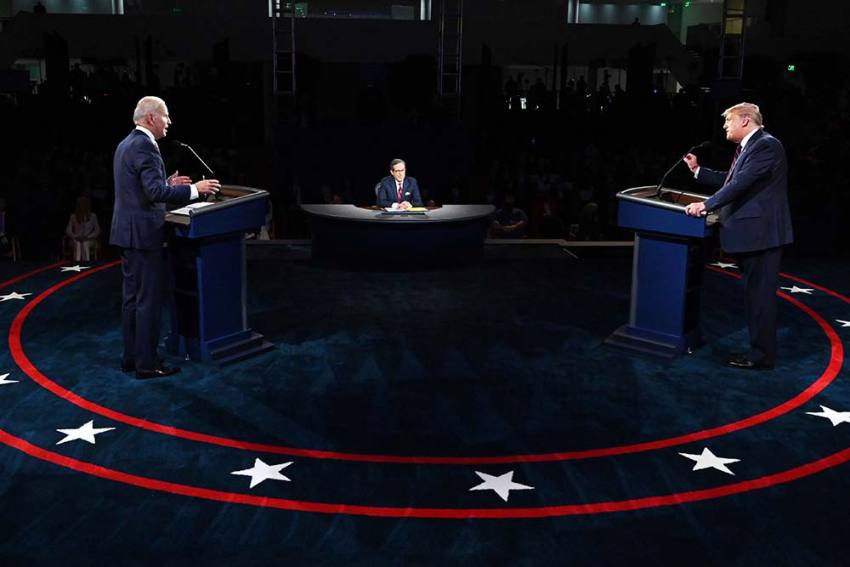Federico Finchelstein, Pablo Piccato, & Jason Stanley
Many Americans can see that voting for President Trump is tantamount to endorsing white nationalism and the kind of conspiracist, magical thinking that denies real threats like pandemics and climate change. But it also must be recognised that failing to vote against Trump in this year’s election is itself a form of collaboration with an attack on democracy that is already underway.
America today is threatened not just by authoritarianism but by fascism, which operates as an explicitly anti-democratic cult centered around a leader who promises national restoration in the face of humiliation supposedly caused by minorities, liberals, and Marxists. Because fascism glorifies violence and the militarisation of politics, we should be wary of the fact that Trump has refused to commit to a peaceful transfer of power. Even if his regular use of anti-democratic rhetoric is merely a tactic to divert attention from his failure to manage the pandemic, such language from an elected leader is shocking.
But many Americans are not shocked at all. By normalising anti-democratic speech and ideology, Trump has increasingly normalised authoritarian rule, too. That is why this election must be understood as a struggle for the survival of American democracy itself.
To be sure, whereas fascism typically offers a grand vision of “national restoration,” Trump has no such vision to speak of. But that does not mean America is safe from fascism. Trump’s attacks on democracy are a response to challenges that his personality cult is facing, both from nationwide mobilisation of resistance against its main ideological pillar, white nationalism, and from the Democratic Party, which seems more unified than ever.
These two threats are not coordinated, as Trumpian propaganda would have it. But they have created a pretext for Trump to deploy the fascist playbook even more aggressively than he has before. As with the classic fascist movements of the past, this new, more dangerous phase of Trumpism features a campaign that has doubled down on messianic leadership, the subornation of violence, and open attacks on the constitutional order.
Trump embodies whatever his supporters want, even when they themselves don’t know what that is. This is all too typical of fascist leaders, who usually function as a father figure for those susceptible to the appeal of an authoritarian personality. In this context, other forms of authority (be it scientific or legal) are seen as direct threats to an aspiring fascist leader. It is no wonder Trump responds with immediate anger when he is contradicted by Anthony Fauci, the top US infectious-disease expert. When Trump himself fell ill with Covid, he used the occasion not as a wake-up call but an opportunity to demonstrate his physical strength (with the help of powerful steroids).
Finally, with Trump occupying the position of the father, there is a strong religious dimension to Trumpism. In this context, one must not take lightly Trump’s cynical and clumsy displays of religiosity. The more that Trump’s followers regard him as a kind of divine authority, the more justified they will feel in using violence to defend him. The armed civilians who threaten and even shoot protesters in streets are not ‘defending property.’ Rather, they are claiming the right to use violence against the leader’s enemies.
With the approach of Election Day, Trump has elevated the risk of fascism. He routinely depicts those who oppose him in brazenly racist terms, and his administration has supercharged its mistreatment of immigrants under its control, including by allegedly allowing a ‘silent pandemic’ to spread through an immigrant detention centre in Georgia.
Trump has also been stepping up his campaign to undermine the public’s trust in electoral institutions. Here, he has been building on Republicans’ long history of efforts to disenfranchise African-American voters and gerrymandering to reduce the weight of votes in more diverse, left-leaning urban centres. The point of all this is to head off the possibility of an electoral loss by claiming a broad, anti-democratic cabal of media elites is ‘rigging’ the system to block the will of the people.
If Trump does not accept an electoral defeat, he will have nowhere else to turn but toward a distinctively fascist form of authoritarianism. The implication is clear: failing to vote against the Trump cult is no different than joining it oneself.
Finchelstein is Prof of History at New School for Social Research and Eugene Lang College. Piccato is Prof of History at Columbia University. Stanley is Prof of Philosophy at Yale University. ©Project Syndicate.
